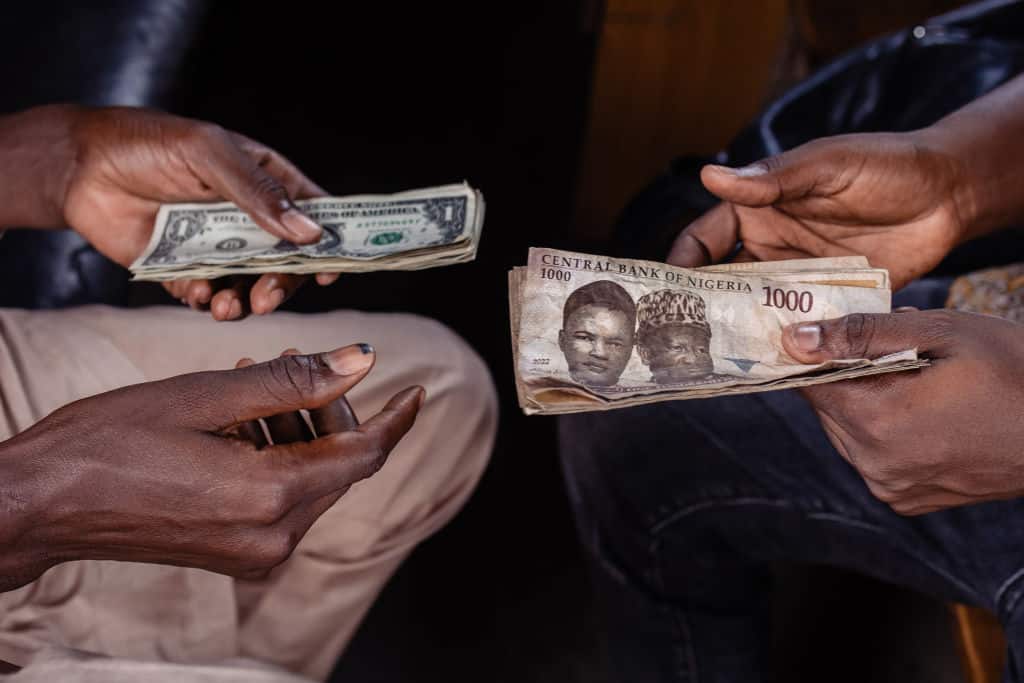The strain is concerning for entrepreneurs who highlight the challenges posed by exchange rate volatility and call for sustainable solutions amid fluctuating policies and economic dynamics.
The Nigerian naira is facing continuous strain on the foreign exchange (FX) market, reaching ₦1,145 per dollar on the parallel market, a slight dip from ₦1,140 on Monday.
Two pivotal policies, implemented since President Bola Tinubu’s inauguration on May 29, have significantly influenced Nigeria’s economic landscape. The immediate cessation of the fuel subsidy on the inauguration day and the naira unification on June 14 marked a departure toward a free-floating system by the Central Bank of Nigeria (CBN).
Under this system, deposit money banks (DMBs) and forex market dealers are allowed to engage in unrestricted buying and selling of currency at market-determined rates. This shift signifies a move away from the previous multiple forex regime to a more flexible approach.
The naira experienced a period of depreciation, plummeting to ₦1,310 in October on the parallel market. However, it briefly rebounded to ₦960 in early November. While the naira is demonstrating signs of appreciation at the investors and exporters (I&E) window, the parallel market remains a preferred choice for urgent business transactions due to its ease of accessibility. This preference intensifies the pressure on the naira.
When requesting foreign currency in Nigerian banks, certain regulatory documents are necessary for Form A, including Personal Travel Allowance (PTA), Business Travel Allowance (BTA), school fees, and medical fees. Additionally, Form Q applications for Small and Medium Enterprises (SMEs) may entail a rigorous and time-consuming process which takes days.
At the Autonomous Foreign Exchange Market (NAFEM), the naira was quoted at ₦830.97 on Tuesday, an appreciation from ₦847.55 quoted on Monday, as reported by data from the Financial Markets Dealers Quotations (FMDQ).
The official market witnessed a peak spot rate of ₦1,120 per dollar and a lower rate of ₦701 on Friday. The daily FX market turnover surged by 23.60 percent to $157.78 million on Friday from the $127.65 million recorded on Thursday, reflecting the dynamic nature of the foreign exchange landscape in Nigeria.
Exporters like Oluwaseun Obilana are expressing deep concern over the implications for their businesses.
Obilana, a player in Nigeria’s export industry, voices his apprehension about the continuous strain on the national currency as exporters rely on stable exchange rates for international trade.
Emphasizing the challenges this poses for exporters, Obilana states to FORBES AFRICA, “The volatility in the exchange rate is affecting our ability to plan and price our products competitively in the global market. It adds uncertainty to our operations and erodes the profitability of our businesses.”
He adds: “A weaker naira not only impacts pricing but also raises the cost of importing raw materials and machinery crucial for manufacturing and production. This, in turn, could have cascading effects on the overall economy.”
The CBN has been grappling with measures to stabilize the exchange rate, implementing various policies to address the challenges faced in the FX market. However, the recent fluctuations indicate the persistence of underlying issues that continue to pose a threat to the stability of the national currency.
Obilana calls for more sustainable solutions to ensure the stability of the naira.
Nigerian investor Moses Adeolubodun highlights the need for a comprehensive strategy to address the challenges facing the naira.
“The consistent depreciation of the naira is a cause for concern and demands urgent attention from relevant authorities. A resilient and stable currency is crucial for investor confidence and economic growth,” Adeolubodun tells FORBES AFRICA.
He also attributes the recent fluctuations to a variety of factors, including global economic uncertainties, fluctuating oil prices, and domestic challenges. Nigeria, being an oil-dependent economy, is particularly susceptible to the volatility of oil markets. “The recent trend has put additional pressure on policymakers to explore more effective solutions.”
Adeolubodun emphasizes the importance of collaborative efforts between the government and the private sector to devise sustainable strategies. “We need a holistic approach that addresses both short-term challenges and establishes a foundation for long-term stability,” he states.
